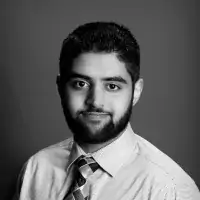
Ravi Gill
MDS Computational Linguistics, Class of 2020
After completing his undergraduate degree in computer science from Vancouver Island University, Ravi Gill was fully committed in moving directly into the workforce. However, Gill’s senior undergrad project involved using machine learning to look at social media metadata over time (number of likes, shares, etc…) and try to predict the next most popular musician.
This project led to an 8-month co-op with TELUS which focused heavily on machine learning and text processing.
“This changed my perspective and interests from programming for software to programming for data science. I wanted to gain further knowledge about the algorithms we used and why they did or didn’t perform as we expected,” explained Gill.
Afterwards, Gill began looking for master’s programs related to data science in British Columbia. Gill’s research led him to UBC’s Master of Data Science (MDS) program in Vancouver as well as UBC’s MDS in Computational Linguistics (CL) program.
Gill chose MDS-CL because it gave him opportunity to learn about natural language processing (NLP) in a classroom setting versus trying to do it on his own.
While his computer science background helped prepare Gill for the programming aspect of the MDS-CL program, he reviewed a lot of statistics from his undergrad courses and completed some basic free stats courses online prior to entering the program. However, Gill wished that he studied more basic linguistics concepts, which he identified as his biggest weakness.
“I was able to pick up the knowledge required during the courses but it would have been easier if I had done some preparation beforehand,” he added. “However, it wasn’t a huge problem since the TAs did a good job at taking time to make sure everybody was up to speed as everyone was coming from different backgrounds.”
Gill is grateful that the program did a great job of making sure students have good programming, statistical, and linguistic background needed in order to succeed in the program and job market post-graduation.
“The program exposed us to most of the big topics in computational linguistics such as sentiment analysis, text classification, or machine translation,” he said. “I believe many companies would be ecstatic to find talent fresh out of university with these skills.”
In addition, Gill was appreciative of the connections he was able to make during the program.
“The program organizers made sure to share an abundance of resources about events, job fairs, or presentations that students can attend,” he said.
Now that the program has completed, Gill is eager to utilize the skills learned from MDS-CL and apply it to an NLP position.
“I find solving problems and answering questions with data science to be very interesting. I also find it very satisfying to be able to present a set of results to “non-technical managers” and show them the possible benefits that their data can provide them,” said Gill.
Ravi’s Top 3 Tips on Succeeding in the MDS Computational Linguistic Program:
- Start early: Many instructors will release lecture and labs early in the week. I found it very useful to have a glance at the content and do a bit of basic reading into concepts you are very unfamiliar with. I find it less overwhelming and easier to absorb new material if I have a basic understanding of the problem before it is presented in class
- Work as a team: The program would not have been as positive of an experience if we weren’t able to work closely with our classmates. Take advantage of this by making friends and discussing new concepts and labs together. You will hear different perspectives and explanations which will enrich your learning experience.
- Go easy on yourself and be patient: Many concepts learned in the program took me some time to fully absorb. It is okay to only have a general understanding when the topic is first presented. Do not burn yourself out trying to learn every detail too quickly; it is important to take breaks and spread your learning out over time.
